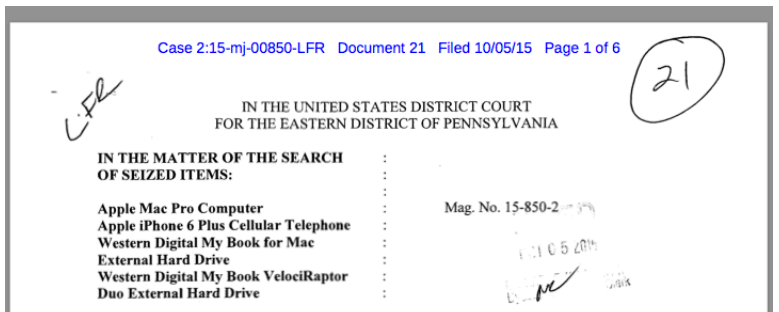The man is in prison because he could not decrypt the contents of the HDD

A Philadelphia resident suspected of possessing child pornography, has been in prison for seven months for refusing to provide passwords to decrypt two HDDs.
It is important that the former police sergeant is not charged with possession of the CPU . His fault is in disobeying the court. According to American law, he will now be kept in custody for an unlimited time: “until he fully complies” with the HDD decryption requirement, as stated in the warrant .
The document states that the suspect was confiscated:
- Apple Mac Pro;
- cell phone Apple iPhone 6 Plus;
- external hard drive Western Digital My Book for Mac;
- external hard drive Western Digital My Book VelociRaptor Duo.
The authorities were unable to examine the contents of the two external disks encrypted by FileVault. The Mac Pro computer was decrypted using the recovery key from the iPhone 5S, but they did not find anything suspicious.
Lawyer Keith Donoghue demands that his ward be released immediately: “He was not only detained without charge, he had never been tried in his life,” he wrote in a petition for the Court of Appeals for the Third District of the United States.
Authorities seek to obtain HDD decryption from suspect based on All Writs Act. Adopted in 1789, the law is valid now, as amended in 1911, as amended, but in principle it has not changed in 227 years. By law, a court “has the right to issue all necessary orders in its jurisdiction that are in accordance with the principles of law” if other legal instruments are not applicable. This is the same law that the Department of Justice tried to apply to Apple , demanding that the San Bernardino offender's iPhone be deciphered, which Apple refused to do . The authorities refused the trial, according to them, had to pay "outside hackers" more than $ 1 million for hacking .
The lawyer believes that in this case the Fifth Amendment to the US Constitution is violated. It states, in particular, that a person accused of committing a crime should not be compelled to testify against himself.
Keith Donohue recalls that in a similar case in 2000, the court decided that the suspect could not be forced to issue a safe code in which evidence could be stored against him. On the other hand, in 2012, a federal appeals court ruled that the accused of bank fraud had to decipher the contents of his laptop, although that decision was not enforced because the experts were able to independently decipher the laptop.
The Foundation for Electronic Frontiers stood up for the suspect in possession of the CP, which published its own statement for the Court of Appeal of the Third District of the United States with an analysis of judicial precedents from 1886 to 2015.
“At its core, coercion to decipher forces the suspect to use the contents of his mind to translate incomprehensible evidence into a form that can be used against him,” explains the lawyers of the Electronic Frontier Foundation, pointing to a clear violation of the Fifth Amendment.
